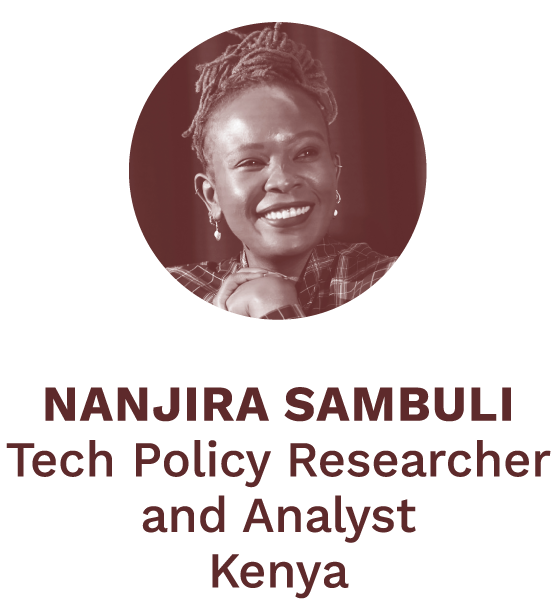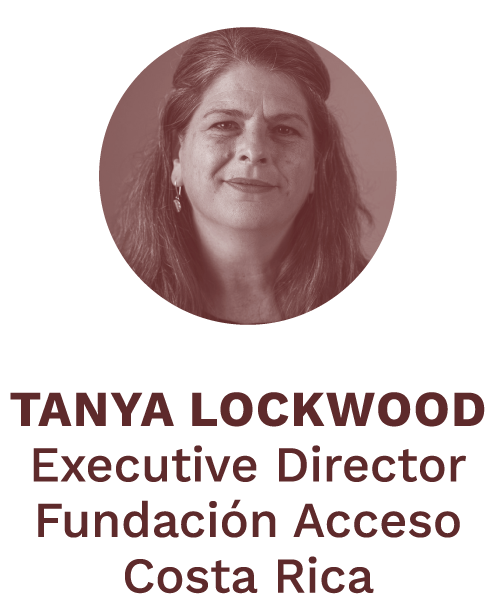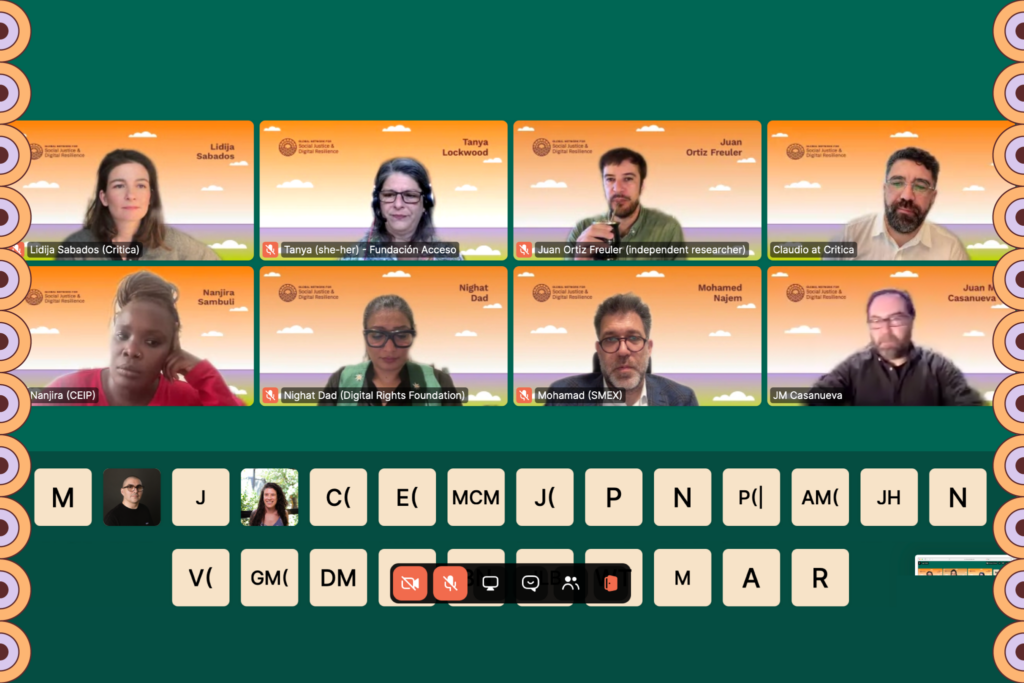The Global Network for Social Justice & Digital Resilience launched on March 20th its first report: “Scanning the Horizon: The Future of Digital Rights & Resilience in the Global Majority”, in a webinar with discussants and participants from the Global South.
Key political, economic and technological trends that impact the human rights and digital rights ecosystem have been the center of an open conversation facilitated by Lidija Sabados, Head of Programs from Crítica, who dialogued with the report’s author, Juan Ortiz Freuler, and a diverse panel of speakers that shared the local challenges and responses from their countries. From the DRN, participants were:
- Tanya Lockwood, Executive Director of Fundación Acceso in Costa Rica.
- Juan Manuel Casanueva, Co-founder and director of SocialTIC in Mexico.
- Mohamad Najem, Executive Director of SMEX in Lebanon.
The conversation was also joined by:
- Nighat Dad, Founder and Executive Director of the Digital Rights Foundation in Pakistan.
- Esra’a Al Shafei, Founder and Executive Director of Majal, Bahrain.
- Nanjira Sambuli, Tech Policy Researcher and Analyst from Kenya.
Three key areas: geopolitics, technology, and activism.
As the webinar focused on the technological trends and their impact in the Global South, some conclusions became evident in the different interventions of the participants:
These trends can’t be separated from the geopolitical realities.
Technical infrastructures are never neutral.
The digital rights environment is dynamic, and organizations need to react to this changing landscape with the available resources. The Scanning the Horizon report is a forecasting exercise that intends to become a collaborative platform to build knowledge and solidarity from South-to-South. “I really think every year we need to update the report because there are so many changes that have happened since it has been launched”, said Mohamad Najem. Related to the report findings, the Executive Director of SMEX also mentioned the importance of working as a coalition: “We are trying to do that in the SWANA region, and also we can see us doing that with this Network, a bigger global majority coalition to actually focus on our own issues that came up with the report because we’ve seen there’s a lot of intersection from all our countries”.

In a context where growing corporate power of tech companies in the North is undermining the ability of institutions to achieve some of their goals, how can civil society organizations rethink the ways in which they’re engaging with companies and government agencies?

“There are some ways that we can respond that enable us to have more agency and power as communities, especially as it relates to the ownership of our data.
The first is supporting the development of local platforms. These could be tools, infrastructure that prioritize community needs and are less extractive.
The second is having alliances to create shared digital infrastructure including the pulling in of resources.
Finally, I think there could be a lot to be done where we can learn more about the pros and cons of also using decentralized protocols to reduce the reliance on centralized corporate platforms.”

“Governments, including Pakistan, have come up with really stringent laws over the years, and so many laws in the name of protecting online spaces but actually criminalizing free speech and penalizing not only activists and journalists but also feminist movements as well.”
“I guess a collective thinking is needed at the moment, but also civil society and groups and actors in the North really need us now more than ever because we can share how we have braved difficult regimes and survived in less resources, and I guess now is the time we can establish global solidarity and push for equitable resources for long-term strategies and not just bridging the two-three months gap that we all are seeking right now.”

As the relationship between donors and funders in the North with organizations working in the Global Majority creates new challenges in the actual global context, how can organizations respond to this from a resilience perspective and how can they prevent some harsher impacts?

“Often the digital rights framing has tried to focus so much on the civil and political rights, but there is the economic power that even users have in their hands in the agency.”

“I think there’s a difference between small resources that we have, but huge knowledge that we have gained.”
“Our initiatives or any initiatives or resilient strategies should also take into account how we can be in a solidarity space without generating more stress into our ecosystems, and more doing without reflecting. That is something very important for our movements in digital rights particularly, but also the solidarity with other movements, and that this is also key for our strength as civic space.”

“I would like to see how we can also encourage consumer groups to see users as much more powerful spaces, in collectives, that can actually hurt many of the revenue sources that the big tech industry has. I think that our sector will continue fighting for rights, but as consumers organizations become much more involved in digital rights I think we can actually have a better chance to have a better say on the table regarding digital rights. And that goes also alongside privacy and surveillance.”
“We are a group of organizations who gather here to share knowledge and capacity, and build skills at the Global South”, said Lidija Sabados at the end of the online event. The launch of the report shed light to the need of approaching trends from a Global South perspective. This will allow civil society organizations to be better prepared and react from local contexts in a collective way. With this first meeting, the Global Network for Social Justice & Digital Resilience strengthened its commitment to support dialogue and network actions in the ecosystem.
Following the webinar, the audience shared some of the topics they considered important for the network to address:
- The implication of technological and political changes for freedom of expression and investigative journalism.
- Strategies and good practices on financial resilience in times of uncertainty.
- Opportunities for meaningful political engagement at international and regional levels in the current context.
- Opportunities and challenges for policy engagement with China.
- Digital regulation policies for the future.
- FLOSS initiatives and collectives for the resistance.
What other topics would you add? Let us know at hello@digitalresilience.network
Watch some highlights of the webinar:

